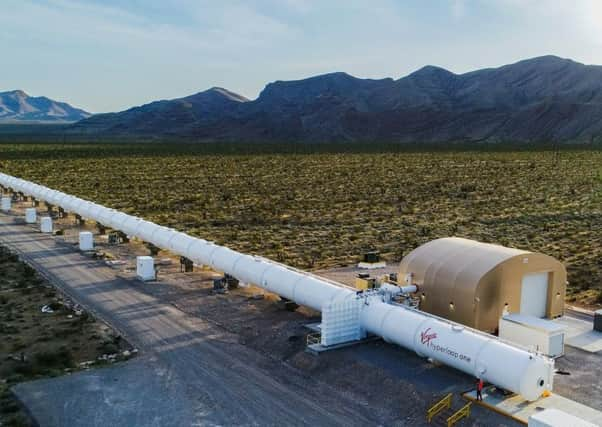Hyperloop: Students join bid to revolutionise transport


Hyperloop would see passengers travel at 600-700mph in pressurised “pods” along a frictionless vacuum tube, which could cut journeys between Edinburgh or Glasgow and London to 30-40 minutes.
Teams at Edinburgh, Heriot-Watt, Glasgow and Strathclyde universities are working on the technology, which has been championed by Elon Musk and Sir Richard Branson.
Advertisement
Hide AdAdvertisement
Hide AdThey are among 52 teams to have reached the design stage of Musk’s latest SpaceX Hyperloop pod contest, from among some 1,300 entries.
Students involved said they were attracted by the chance to get involved in a major project while still at university.
They include engineers, computer scientists, physicists and product designers.
Quentin Pletinckx, studying electronic and electrical engineering at Strathclyde University and president of its StrathLoop group, said: “It offers us the space to play our part in improving society without having to wait for graduation.”
Edinburgh and Heriot-Watt’s HYPED, the largest and most established group with 280 members after being launched three years ago, said: “Students are driven by innovation and the opportunity to do something inspiring and unique.”
Glasgow Hyperloop said: “It offers a rare opportunity to contribute towards something which will be a huge part of the future.”
However, the groups differ in when they think the first passengers will start using Hyperloop.
Advertisement
Hide AdAdvertisement
Hide AdGlasgow Hyperloop predicted it could be as soon as 2025, but HYPED did not expect the UK to see it until around 2040.
There has also been scepticism about its safety, but the groups said the technology was still being developed.
HYPED secretary Hamish Geddes said: “There are valid concerns regarding safety and feasibility of the Hyperloop concept, however at this stage to be conclusive would be naive.”
Matthew Iddon, commercial director of Glasgow Hyperloop, said: “We want to be able to reach speeds that will get people from Glasgow to London faster than doing two circuits on the Glasgow Subway.
“Anybody who is sceptical can be assured it will be safer than modern trains.”
HYPED secretary Hamish Geddes said its work included on propulsion systems and the potential to also transport cargo.
StrathLoop is developing every aspect of the technology, including designing a range of pods such as a premium lounge-style space.
Elsa Larsson, its propulsion systems sub-team leader, said: “our task is to make the pod move, and we want to move it fast.
Advertisement
Hide AdAdvertisement
Hide Ad“For this, we are using spinning magnets in a way that has never been commercialised, and that also will make our pod levitate.”
The Institution of Civil Engineers (ICE) chose HYPED’s work to feature among 200 projects to celebrate its 200th anniversary.
ICE Scotland director Sara Thiam said: “The high profile and entrepreneurial flair of Hyperloop’s founder Elon Musk is undoubtedly a draw for students but the students are motivated by its potential to benefit society.
“ICE is very interested in the potential of Hyperloop but more research and testing will need to take place to assess the technology on a large scale.
“We would then need to carefully consider the challenges and costs of its implementation, its sustainability and most importantly, the benefits it could bring to the passenger over existing methods of transport.”